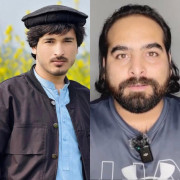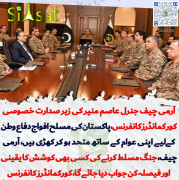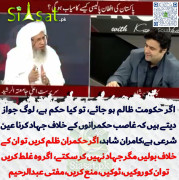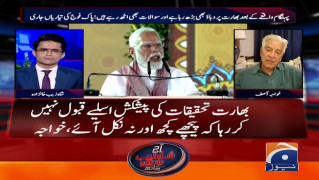hans
Banned

Introduction
Pakistan's military intelligence agency, the Inter-Services Intelligence (ISI), has long faced accusations of meddling in the affairs of its neighbors. A range of officials inside and outside Pakistan have stepped up suggestions of links between the ISI and terrorist groups in recent years. In autumn 2006, a leaked report by a British Defense Ministry think tank charged, "Indirectly Pakistan (through the ISI) has been supporting terrorism and extremism-whether in London on 7/7 [the July 2005 attacks on London's transit system], or in Afghanistan, or Iraq." In June 2008, Afghan officials accused Pakistan's intelligence service of plotting a failed assassination attempt on President Hamid Karzai; shortly thereafter, they implied the ISI's involvement in a July 2008 attack on the Indian embassy. Indian officials also blamed the ISI for the bombing of the Indian embassy. Pakistani officials have denied such a connection.
Numerous U.S. officials have also accused the ISI of supporting terrorist groups, even as the Pakistani government seeks increased aid from Washington with assurances of fighting militants. In a May 2009 interview with CBS' 60 Minutes, U.S. Defense Secretary Robert Gates said "to a certain extent, they play both sides." Gates and others suggest the ISI maintains links with groups like the Afghan Taliban as a "strategic hedge" to help Islamabad gain influence in Kabul once U.S. troops exit the region. These allegations surfaced yet again in July 2010 when WikiLeaks.org made public (NYT) a trove of U.S. intelligence records on the war in Afghanistan. The documents described ISI's links to militant groups fighting U.S. and international forces in Afghanistan. Pakistan's government has repeatedly denied allegations of supporting terrorism, citing as evidence its cooperation in the U.S.-led battle against extremists in which it has taken significant losses both politically and on the battlefield.
Supporting Terrorism?
"The ISI probably would not define what they've done in the past as 'terrorism,'" says William Milam, former U.S. ambassador to Pakistan. Nevertheless, experts say the ISI has supported a number of militant groups in the disputed Kashmir region between Pakistan and India, some of which are on the U.S. State Department's Foreign Terrorist Organizations list. While Pakistan has a formidable military presence near the Indian border, some experts believe the relationship between the military and some Kashmiri groups has greatly changed with the rise of militancy within Pakistan. Shuja Nawaz, author of Crossed Swords: Pakistan, its Army, and the Wars Within, says the ISI "has certainly lost control" of Kashmiri militant groups. According to Nawaz, some of the groups trained by the ISI to fuel insurgency in Kashmir have been implicated in bombings and attacks within Pakistan, therefore making them army targets.
On Pakistan's western border with Afghanistan, the ISI supported the Taliban up to September 11, 2001, though Pakistani officials deny any current support for the group. [Pakistan's government was also one of three countries, along with the United Arab Emirates and Saudi Arabia, that recognized the Taliban government in Afghanistan]. The ISI's first major involvement in Afghanistan came after the Soviet invasion in 1979, when it partnered with the CIA to provide weapons, money, intelligence, and training to the mujahadeen fighting the Red Army. At the time, some voices within the United States questioned the degree to which Pakistani intelligence favored extremist and anti-American fighters. Following the Soviet withdrawal, the ISI continued its involvement in Afghanistan, first supporting resistance fighters opposed to Moscow's puppet government, and later the Taliban.
Pakistan stands accused of allowing that support to continue. Afghan President Hamid Karzai has repeatedly said Pakistan trains militants and sends them across the border. In May 2006, the British chief of staff for southern Afghanistan told the Guardian, "The thinking piece of the Taliban is out of Quetta in Pakistan. It's the major headquarters." Speaking at the Council on Foreign Relations in September 2006, then President Pervez Musharraf responded to such accusations, saying, "It is the most ridiculous thought that the Taliban headquarters can be in Quetta." Nevertheless, experts generally suspect Pakistan still provides some support to the Taliban, though probably not to the extent it did in the past. "If they're giving them support, it's access back and forth [to Afghanistan] and the ability to find safe haven," says Kathy Gannon who covered the region for decades for the Associated Press. Gannon adds that the Afghan Taliban need Pakistan even less as a safe haven now "because they have gained control of more territory inside Afghanistan."
Many in the Pakistani government, including slain former Prime Minister Benazir Bhutto, have called the intelligence agency "a state within a state," working beyond the government's control and pursuing its own foreign policy. But Nawaz says the intelligence agency does not function independently. "It aligns itself to the power center," and does what the government or the army asks it to do, says Nawaz.
Control over the ISI
Constitutionally, the agency is accountable to the prime minister, says Hassan Abbas, research fellow at Harvard's Kennedy School of Government. But most officers in the ISI are from the army, so that is where their loyalties and interests lie, he says. Experts say until the end of 2007, as army chief and president, Musharraf exercised firm control over the intelligence agency. But experts say it is not clear how much control Pakistan's civilian government--led by Bhutto's widower, President Asif Ali Zardari--has over the agency. In July 2008, the Pakistani government announced the ISI will be brought under the control of the interior ministry, but revoked its decision (BBC) within hours. Bruce Riedel, an expert on South Asia at the Brookings Institution, says the civilian leadership has "virtually no control" (PDF) over the army and the ISI. In September 2008, army chief Ashfaq Parvez Kiyani replaced the ISI chief picked by former President Musharraf with Lt. Gen. Ahmed Shuja Pasha. Some experts say the move signals that Kiyani is consolidating his control over the intelligence agency by appointing his man at the top. In November 2008, the government disbanded ISI's political wing, which politicians say was responsible for interfering in domestic politics. Some experts saw it as a move by the army, which faced much criticism when Musharraf was at the helm, to distance itself from politics.
"I do not accept the thesis that the ISI is a rogue organization," Milam says. "It's a disciplined army unit that does what it's told, though it may push the envelope sometimes." With a reported staff of ten thousand, ISI is hardly monolithic: "Like in any secret service, there are rogue elements," says Frederic Grare, a South Asia expert and visiting scholar at the Carnegie Endowment for International Peace. He points out that many of the ISI's agents have ethnic and cultural ties to Afghan insurgents, and naturally sympathize with them. Marvin G. Weinbaum, an expert on Afghanistan and Pakistan at the Middle East Institute, says Pakistan has sent "retired" ISI agents on missions the government could not officially endorse.
Resistance in FATA
Pakistan's tribal areas along the Afghan border have emerged as safe havens for terrorists. Experts say because of their links to the Taliban and other militant groups, the ISI has some influence in the region. But with the mushrooming of armed groups in the tribal agencies, it is hard to say which ones the agency controls. Also, there appears to be divisions within the ISI. While some within the intelligence agency continue to sympathize with the militant groups, Harvard's Abbas says others realize they cannot follow a policy contradictory to that of the army, which is directly involved in counterterrorism operations in the area.
Pasha, former head of military operations in charge of offensives against militants in the tribal areas, was appointed as the ISI chief in September 2008 amid growing U.S. and international pressure on Pakistan to combat terrorism. It was not immediately clear whether his appointment would lead to policy changes in the spy agency.
Mixed Record on Counterterrorism
Pakistan has arrested scores of al-Qaeda affiliates, including Khalid Sheikh Mohammed, the alleged mastermind of the 9/11 attacks. The ISI and the Pakistani military have worked effectively with the United States to pursue the remnants of al-Qaeda. Following 9/11, Pakistan also stationed eighty thousand troops in the troubled province of Waziristan near the Afghan border. Hundreds of Pakistani soldiers died there in resulting clashes with militants, which, as Musharraf told a CFR meeting in September 2006, "broke the al-Qaeda network's back in Pakistan."
But Musharraf did crack down on terrorist groups selectively, as this Backgrounder points out. Weinbaum in 2006 said the Pakistani military has largely ignored Taliban fighters on its soil. "There are extremist groups that are beyond the pale with which the ISI has no influence at all," he says. "Those are the ones they go after." In 2008, Ashley J. Tellis, senior associate at the Carnegie Endowment for International Peace, wrote (PDF) in The Washington Quarterly that Musharraf tightened pressure on groups whose objectives were out of sync with the military's perception of Pakistan's national interest.
The Taliban as a Strategic Asset
Pakistan does not enjoy good relations with the current leadership of Afghanistan, partly because of rhetorical clashes with Afghan President Hamid Karzai, and partly because Karzai has forged strong ties with India. But there have been increased efforts by the United States to close this gap. The Obama administration's regional strategy unveiled in March 2009 focused on creating new diplomatic mechanisms; a trilateral summit of the leaders of the United States, Pakistan, and Afghanistan has been one such step toward helping reduce the level of distrust that runs among all three countries. But lingering suspicions about ISI's support for the Taliban continue to pose problems. In an October 2006 interview, Musharraf said some retired ISI operatives could be abetting the Taliban insurgency in Afghanistan, but he denied any active links. Zardari too, denies any ISI links with the Taliban or al-Qaeda. In a May 2009 interview with CNN, he remarked all intelligence agencies have their sources in militant organizations but that does not translate to support. "Does that mean CIA has direct links with al-Qaeda? No, they have their sources. We have our sources. Everybody has sources."
Some experts say Pakistan wants to see a stable, friendlier government emerge in Afghanistan. Though the insurgency certainly doesn't serve this goal, increased Taliban influence, especially in the government, might. Supporting the Taliban also allows Pakistan to hedge its bets should the NATO coalition pull out of Afghanistan. In a February 2008 interview with CFR.org, Tellis said the Pakistani intelligence services continue to support the Taliban because they see the Taliban leadership "as a strategic asset," a reliable back-up force in case things go sour in Afghanistan.
Not everyone agrees with this analysis. According to Weinbaum, Pakistan has two policies. One is an official policy of promoting stability in Afghanistan; the other is an unofficial policy of supporting jihadis in order to appease political forces within Pakistan. "The second [policy] undermines the first one," he says. Nawaz says there is ambivalence within the army regarding support for the Taliban. "They'd rather not deal with the Afghan Taliban as an adversary," he says.
Allegations of Terrorist Attacks
Indian officials implicated the ISI for the November 2008 terrorist attacks in Mumbai that killed nearly two hundred people. India's foreign ministry said the ISI had links (Reuters) to the planners of the attacks, the banned militant group Lashkar-e-Taiba, which New Delhi blames for the assault. Islamabad denies allegations of any official involvement, but acknowledged in February 2009 that the attack was launched and partly planned (AP) from Pakistan. The Pakistani government has also detained several Islamist leaders, some of them named by India as planners of the Mumbai assault. Gannon says this is an unusual step by Pakistan which never got enough credit in India because the country was in the middle of a national election. "I don't see any evidence" to believe that the ISI was behind the Mumbai attack, she says. However, she doubts the agency has severed all its ties with groups like Lashkar-e-Taiba which it supported to fight in Indian-administered Kashmir. Indian officials also claim to have evidence that the ISI planned the July 2006 bombing of the Mumbai commuter trains, but these charges seem unlikely to some observers of the long, difficult India-Pakistan relationship. The two nations have a history of finger-pointing, and while some of the allegations hold water, there is a tendency to exaggerate.
Following the release of the British report regarding its July 7, 2005 bombings of London's mass transit system--which London insists is not a statement of policy--Weinbaum said it makes "too broad a statement." Though Pakistan does offer safe haven to Kashmiri groups, and perhaps some Taliban fighters, the suggestion that the ISI is responsible for the 7/7 bombings is "a real stretch," Gannon says.

Source: http://www.cfr.org/pakistan/isi-terrorism-behind-accusations/p11644
Last edited by a moderator:

























